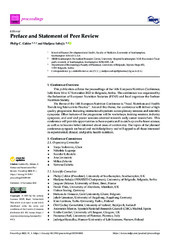Приказ основних података о документу
Capacity Development and Harmonization of Food Consumption Data Collection in EFSA EU Menu National Dietary Surveys in Balkan Region-Building: The Evidence Base for Diet Monitoring and Food Systems Transformation
| dc.creator | Gurinović, Mirjana | |
| dc.creator | Milešević, Jelena | |
| dc.creator | Zeković, Milica | |
| dc.creator | Knez, Marija | |
| dc.creator | Takić, Marija | |
| dc.creator | Šarac, Ivana | |
| dc.creator | Kadvan, Agneš | |
| dc.date.accessioned | 2024-01-30T23:55:33Z | |
| dc.date.available | 2024-01-30T23:55:33Z | |
| dc.date.issued | 2023 | |
| dc.identifier.issn | 2504-3900 | |
| dc.identifier.uri | http://rimi.imi.bg.ac.rs/handle/123456789/1441 | |
| dc.description.abstract | Harmonized and standardized collection, processing, and analysis of individual dietary data is essential for nutrition assessment and informed policy decision making. To underpin the harmonization of food consumption data collection methodologies and the development of a common, comprehensive European food consumption database, the European Food Safety Authority (EFSA) supported 36 child and/or adult dietary surveys in 18 EU Member States and four Balkan preaccession countries through the EU Menu Project. Given the lack of relevant and harmonized research and data on food and nutrition in the Balkan region, CENM-IMR and CAPNUTRA scientists focused their activities on capacity building in nutrition research, particularly on the creation of a contemporary, harmonized research infrastructure (RI) that meets European standards. The EFSA EU Menu methodology has been implemented in the Balkans through the adaptation and use of an innovative, comprehensive tool for the standardized collection of food consumption and dietary intake assessment data, the Diet Assess and Plan (DAP). DAP has the essential features of an RI needed to strengthen public health surveillance, monitoring, evaluation, and nutrition research; this is a unique example of a standardized and harmonized tool for assessing dietary intake, i.e., collecting data on food and nutrition in the Balkan region and beyond. It is a concurrent tool for large-scale nutritional epidemiological studies and represents one of the new technologies for dietary intake assessment. National dietary surveys were conducted from 2017 to 2023 among adults aged 10 to 74 years (in Bosnia and Herzegovina, Montenegro, and Serbia) and children aged three months to nine years (in Montenegro, North Macedonia, and Serbia). The collected data on food consumption are internationally comparable with other European countries under the EU Menu Program. The data collected will be used for dietary and exposure risk assessment, establishment of national nutrient reference values, as a basis for the development of food-based dietary guidelines, a tool to provide evidence and infrastructure for public health nutrition policy decisions, and for tailored pathways to transform the food system in the Balkans towards a more nutrition-sensitive and sustainable system. | sr |
| dc.language.iso | en | sr |
| dc.publisher | Basel, Switzerland: MDPI (Multidisciplinary Digital Publishing Institute) | sr |
| dc.relation | info:eu-repo/grantAgreement/MESTD/inst-2020/200015/RS// | |
| dc.rights | openAccess | sr |
| dc.rights.uri | https://creativecommons.org/licenses/by/4.0/ | |
| dc.source | Proceedings of The 14th European Nutrition Conference FENS 2023: “Food, Nutrition and Health:Translating Science into Practice”, 14 to 17 November 2023, Belgrade, Serbia | sr |
| dc.subject | capacity development | sr |
| dc.subject | food consumption | sr |
| dc.subject | EU Menu | sr |
| dc.subject | harmonization | sr |
| dc.title | Capacity Development and Harmonization of Food Consumption Data Collection in EFSA EU Menu National Dietary Surveys in Balkan Region-Building: The Evidence Base for Diet Monitoring and Food Systems Transformation | sr |
| dc.type | conferenceObject | sr |
| dc.rights.license | BY | sr |
| dc.citation.issue | 1 | |
| dc.citation.spage | 24 | |
| dc.citation.volume | 91 | |
| dc.identifier.doi | 10.3390/proceedings2023091024 | |
| dc.identifier.fulltext | http://rimi.imi.bg.ac.rs/bitstream/id/3366/FENS2023_Capacity_Development_and_Harmonization_of_Food.pdf | |
| dc.type.version | publishedVersion | sr |

